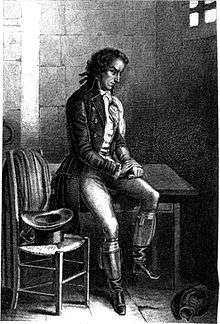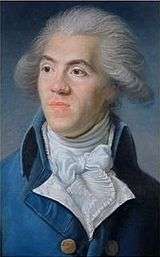Antoine Barnave
| Antoine Barnave | |
|---|---|
|
Antoine Barnave by Joseph Boze (1791, Carnavalet Museum) | |
| Member of the Legislative Assembly | |
|
In office 1 October 1791 – 20 September 1792 | |
| Constituency | Isère |
| 3rd Mayor of Grenoble | |
|
In office 1 August 1790 – 21 November 1790 | |
| Preceded by | Joseph Marie de Barral |
| Succeeded by | Daniel d'Isoard |
| Member of the Constituent Assembly | |
|
In office 9 July 1789 – 30 September 1791 | |
| Constituency | Grenoble |
| Member of the Estates-General for the Third Estate | |
|
In office 7 January 1789 – 9 July 1789 | |
| Constituency | Grenoble |
| Personal details | |
| Born |
Antoine Pierre Joseph Marie Barnave 22 October 1761 Grenoble, France |
| Died |
29 November 1793 (aged 32) Paris, France |
| Nationality | French |
| Political party |
Jacobin (1789–1791) Feuillant (1791–1793) |
| Parents | Jean-Pierre Barnave and Marie-Louise de Pré de Seigle de Presle |
| Alma mater | University of Grenoble |
| Profession | Lawyer, writer |
| Religion | Calvinism (baptized) |
Antoine Pierre Joseph Marie Barnave (22 October 1761 – 29 November 1793) was a French politician, and, together with Honoré Mirabeau, one of the most influential orators of the early part of the French Revolution. He is most notable for correspondence with Marie Antoinette in an attempt to set up a constitutional monarchy and for being one of the founding members of the Feuillants.[1]
Early life
He was born at Grenoble in Dauphiné, of a Protestant family. His father was a barrister at the Parlement of Grenoble, and his mother was an upper-class educated woman. Because they were a Protestant family, Antoine could not attend local schools as those were run by the Catholic church, and his mother educated him herself. Barnave was prepared for a career in law, and at the age of twenty-two made himself known by a speech pronounced before the local Parlement on the division of political powers.
Dauphiné was one of the first of the provinces of France to be touched by revolutionary ideals. After being heavily influenced by the Day of the Tiles (French: Journée des Tuiles) in Grenoble, Barnave became actively revolutionary. He explained his political position in a pamphlet entitled Esprit des édüs enregistrés militairement le 20 mai 1788. He was immediately elected deputy, with his father, to the states of Dauphiné, and played a prominent role in their debates.
Estates-General and Assemblies
A few months later he became better known, when the Estates-General of 1789 convened at the Palace of Versailles for 5 May 1789, and Barnave was chosen to be a deputy of the Third Estate for his native province of Dauphiné.
He soon rose to prominence in the National Assembly, becoming the friend of most of the leaders of the party originating in the Third Estate, and formed with Adrien Duport and Alexandre Lameth the group known during the Constituent Assembly as "the triumvirate". Together these three would later be principal figures in the formation of the Feuillants, the breakaway party from the Jacobin Club dedicated to a moderate course supporting constitutional monarchy. Barnave took part in the conference on the claims of the three orders, drew up the first address to King Louis XVI, and supported the proposal of Emmanuel Joseph Sieyès that the Assembly should declare itself "National". Until 1791, he was one of the main members of the club known later as the Jacobins, of which he drew up the manifesto and first rulebook.
Political Views
Although a partisan of political freedoms, he hoped to preserve revolutionary liberties together while maintaining the ruling House of Bourbon. Barnave felt that a constitutional monarchy would solve the problems facing France without being a complete upheaval of the government. This does not mean he was entirely in favor of the monarchy, however. Subject to the more radical forces, Barnave took part in the attacks on the monarchy, on the clergy, on Roman Catholic Church property, and on the provincial Parlements. On several occasions he stood in opposition to Mirabeau. After the storming of the Bastille, he saw the power of the masses as a possibly leading to political chaos and wished to avoid this by saving the throne. He advocated the suspensory veto, and the establishment of trial by jury in civil causes, but voted with the Left against the system of two chambers.
His conflict with Mirabeau on the question of assigning to the King the right to make peace or war (from 16 to 23 May 1790) was one of the main episodes of the Assembly's mandate. In August 1790, after a vehement debate, he fought a duel with Jacques Antoine Marie de Cazalès, in which the latter was slightly wounded. About the close of October 1790, Barnave was called to the presidency of the Assembly. On the death of Mirabeau a few months later, Barnave paid a high tribute to his worth and public services, designating him the "William Shakespeare of oratory".
Rise, Decline, and Execution

On the arrest of the king and the royal family during the Flight to Varennes, Barnave was one of the three appointed to conduct them back to Paris, along with Jerome Petion and the Marquis de Latour-Maubourg. During the journey, he began to feel compassion for Queen Marie-Antoinette and the Royal Family, and subsequently attempted to do what he could to alleviate their sufferings. In one of his most powerful speeches, he maintained the inviolability of the king’s person.
As the Jacobin Club grew more radically in favor of a republic, Barnave and the other members of the triumvirate separated from them to form the Feuillant party in early 1791. In the summer of 1791, July and August specifically, Barnave reached his height of political prominence after the 17 July 1791 Champ de Mars Massacre weakened the position of the Jacobins.
The Feuillants began to lose this political clout by early autumn however, a matter that was complicated by disagreements that arose with the growing influence of Jacques Pierre Brissot and his supporters, known as the Girondists. After the Feuillants opposed war against Austria and the Habsburgs, they were driven out of the Assembly. Barnave's public career came to an end, and he returned to Grenoble at the beginning of 1792. His sympathy and relations with the royal family, to whom he had submitted a plan for a counter-revolution, and his desire to check the violence of the Revolution, brought on him suspicion of treason.
He was denounced on 15 August 1792 in the Legislative Assembly, arrested and imprisoned for ten months at Grenoble, then transferred to Fort Barraux, and in November 1793 to Paris (during the Reign of Terror). On 28 November he appeared before the Revolutionary Tribunal. He was condemned for treason on the evidence of papers detailing his extensive clandestine correspondence with Queen Marie Antoinette found in the Tuileries Palace, and guillotined the next day, alongside Marguerite-Louis-François Duport-Dutertre.
Correspondence with Marie Antoinette
Along with Jérôme Pétion and the Marquis de Latour-Maubourg, Barnave had been sent on behalf of the National Assembly to escort the extravagant berline carriage, with the Royal Family within, from Varennes back to Paris. It was in this setting that Barnave first met Queen Marie Antoinette. Though their initial interactions were marked by Barnave’s shy attempts to avoid eye contact, the queen was soon able to charm the twenty-nine-year-old politician and earn his favor. The two were reported to have been seen conversing intently on several occasions within the carriage, and near the rest stops, on the journey from Varennes. Purportedly, the subject of these conversations included Barnave and the rest of the Feuillants’ fervent belief that a constitutional monarchy was the most viable solution for ending the revolution with a minimum of further bloodshed.
Much evidence indicates that, because her closest friends, including Count von Fersen (who had organized the flight from Paris), were absent, Marie Antoinette was attempting to influence Barnave and his fellow Feuillants as a way to ensure her family’s safety. She may also have dared to hope that it was still possible to reinstate some form of the former monarchy. Barnave was, quite clearly, taken by the Queen’s charm and waited for her to call on him when she was in grave circumstances.
This hour arrived only a few weeks later when, in early July 1791, Marie Antoinette wrote to Barnave the first of a long series of cryptic communications. Referring to him by a code name, Barnave received his letters through an unknown similarly codenamed intermediary. Her instructions were that her letter be read while the intermediary stood by to accept a reply; then he would return both documents to the queen. She herself never wrote any of the letters; instead, she dictated them so as to avoid embarrassing, and possibly incriminating, documentation.
Eventually, the entire series of letters were smuggled out of the Tuileries to Count von Fersen who sent them to his sister in Sweden where they remain today. The letters revealed that Barnave was confident of his influence in the National Assembly, especially in light of the massacre on the Champ de Mars.
Notes
- ↑ François Furet and Mona Ozouf, eds. A Critical Dictionary of the French Revolution (1989), pp 186-96
References
 Chisholm, Hugh, ed. (1911). "Barnave, Antoine Pierre Joseph Marie". Encyclopædia Britannica (11th ed.). Cambridge University Press.
Chisholm, Hugh, ed. (1911). "Barnave, Antoine Pierre Joseph Marie". Encyclopædia Britannica (11th ed.). Cambridge University Press.
Further reading
- Andress, David. The Terror: The Merciless War for Freedom in Revolutionary France New York: Farrar, Straus, and Giroux, 2005. pp. 38–70.
- Furet, François and Mona Ozouf, eds. A Critical Dictionary of the French Revolution (1989), pp. 186–96
- Linton, Marisa, Choosing Terror: Virtue, Friendship and Authenticity in the French Revolution (Oxford University Press, 2013).
- Linton, Marisa, 'Friends, Enemies and the Role of the Individual', in Peter McPhee (ed.), Companion to the History of the French Revolution (Wiley-Blackwell, 2013), 263-77.
Primary sources
- Joseph Barnave and Emanuel Chill. Power, Property and History: Introduction to the French Revolution (1972), includes a translation of Barnave's Introduction to the French Revolution and a 74pp preface by Chill
- Heidenstam, Oscar Gustaf von, Marie Antoinette, Hans Axel von Fersen, and Joseph Barnave. 1926. The letters of Marie Antoinette, Fersen and Barnave. London: John Lane.
